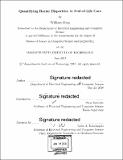| dc.contributor.advisor | Peter Szolovits. | en_US |
| dc.contributor.author | Boag, William (William George) | en_US |
| dc.contributor.other | Massachusetts Institute of Technology. Department of Electrical Engineering and Computer Science. | en_US |
| dc.date.accessioned | 2018-09-17T15:55:52Z | |
| dc.date.available | 2018-09-17T15:55:52Z | |
| dc.date.copyright | 2018 | en_US |
| dc.date.issued | 2018 | en_US |
| dc.identifier.uri | http://hdl.handle.net/1721.1/118063 | |
| dc.description | Thesis: S.M., Massachusetts Institute of Technology, Department of Electrical Engineering and Computer Science, 2018. | en_US |
| dc.description | Cataloged from PDF version of thesis. | en_US |
| dc.description | Includes bibliographical references (pages 75-80). | en_US |
| dc.description.abstract | There are established racial disparities in healthcare, particularly during end-of-life care when poor communication and historical inequities can lead to suboptimal options and outcomes for patients and their families. Previous work has suggested that medical disparities can reflect higher rates of mistrust for the healthcare system among black patients. When the doctor-patient relationship lacks trust, patients may believe that limiting any intensive treatment is unjustly motivated, and demand higher levels of aggressive care. While there are clinical examples of exemplary end-of-life care, studies have highlighted that aggressive care can lead to painful final moments, and may not improve patient outcomes. In this thesis, I demonstrate that racial disparities which have been reported previously are also present in two public databases. I explore the notion that one underlying cause of this disparity is due to mistrust between patient and caregivers, and develop a multiple trust metric proxies to measure such mistrust more directly. These metric demonstrate even stronger disparities in end-of-life care than race does and statistically significant higher levels of mistrust for black populations. I hope that this work will serve as a useful view for bias and fairness in clinical data, and that future work can better understand mistrust so that its underlying factors (e.g. poor communication and perceived discrimination) can be addressed. | en_US |
| dc.description.statementofresponsibility | by William Boag. | en_US |
| dc.format.extent | 80 pages | en_US |
| dc.language.iso | eng | en_US |
| dc.publisher | Massachusetts Institute of Technology | en_US |
| dc.rights | MIT theses are protected by copyright. They may be viewed, downloaded, or printed from this source but further reproduction or distribution in any format is prohibited without written permission. | en_US |
| dc.rights.uri | http://dspace.mit.edu/handle/1721.1/7582 | en_US |
| dc.subject | Electrical Engineering and Computer Science. | en_US |
| dc.title | Quantifying racial disparities in end-of-life care | en_US |
| dc.type | Thesis | en_US |
| dc.description.degree | S.M. | en_US |
| dc.contributor.department | Massachusetts Institute of Technology. Department of Electrical Engineering and Computer Science | |
| dc.identifier.oclc | 1051460511 | en_US |
